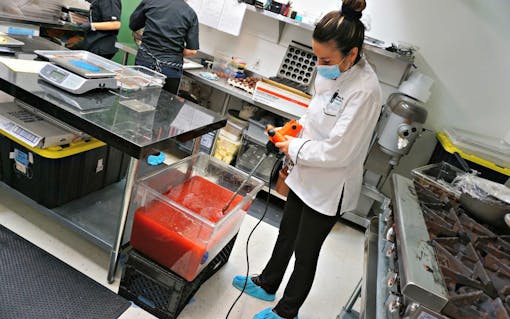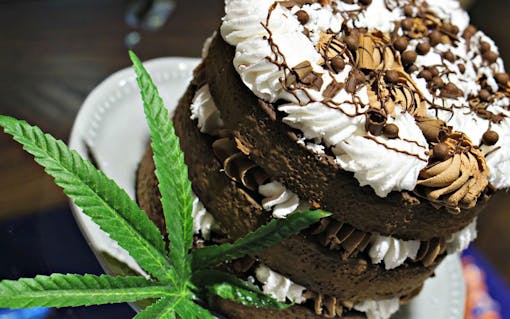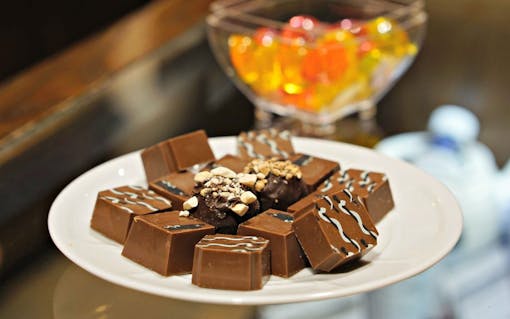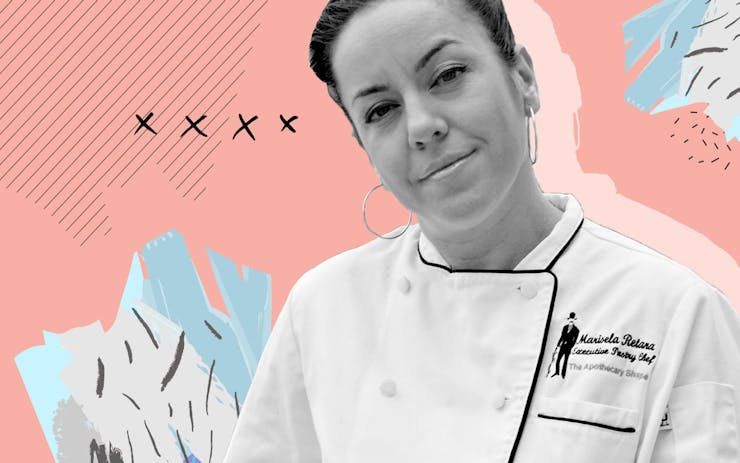People who care about food care about Joël Robuchon. He was famously named “Chef of the Century” by a French publication in 1989 and the tagline stuck as he developed a culinary empire of fine dining restaurants throughout the world. Popular with foodies and critics who appreciate foie gras as much as fine wine, just four of his 28 restaurants are in the United States—and two happen to be next to each other on the casino floor of the MGM Grand in Las Vegas.Craving Something Sweet?Marisela Retana spent five years in the pastry department at the eponymous Joël Robuchon and L’Atelier de Joël Robuchon, an experience that exposed her to the detail-oriented approach and demanding standards involved in upscale food presentations. “The work has to be so precise, so delicate, and so perfect,” she says. “There is a person who will spend two or three hours preparing and polishing plates with alcohol. Everything has to be nicely decorated by hand.”
“The work has to be so precise, so delicate, and so perfect. There is a person who will spend two or three hours preparing and polishing plates with alcohol. Everything has to be nicely decorated by hand.”
That’s especially true for the desserts and pastries, which complement the multi-course tasting menus that are the hallmark of Robuchon restaurants. “I learned a lot about gourmet ingredients,” says Retana. “Expensive nuts, expensive spices—like going from pepper to saffron. The most expensive butter and heavy creams you can imagine. You have to use a specific kind of sugar.”
However, fine dining often means late-night hours and Retana eventually left the Robuchon team for a position at Caesars Palace. She spent five years at the property, including time at Payard Patisserie & Bistro by acclaimed French pastry chef François Payard.
“Going through the system of the casinos is an amazing experience,” says Retana. “You feel like you’re prepared for anything.”
In this case, “anything” turned out to be the world of cannabis-infused edibles.
Shifting a Chef’s Mindset With a Little THC

(Courtesy of Robert Kachelriess)
Retana was hired as the executive pastry chef for the Apothecary Shoppe and its culinary brand, Top Hat Confections, in early 2017. Less than two miles west of the Strip, the Apothecary Shoppe is an easy ride for tourists staying at the big resorts. It’s operated by a team of doctors, including CEO Nick Spirtos, an oncologist who believes in cannabis for its medical, recreational and yes, commercial benefits. For all the elements to work, quality is stressed as the main priority.
“We went for the best chocolatier and dessert chef we could find,” says Dr. Spirtos, who hired Retana based on a recommendation from a patient who was also a sous chef on the Strip. “Her work is excellent. She’s elevated the whole spectrum of edibles.”
On any given day, Retana can be found inside, working by hand with her staff to produce a lineup of edibles that stand out from the rapidly growing competition in Las Vegas.
The Apothecary Shoppe’s kitchen is a few miles away from the dispensary in a small gated compound on a quiet side street in Chinatown. Sharing space with cultivation, production, and extraction facilities, the warehouse makes a point to not draw attention to itself, despite being watched carefully by an alert all-business team of security guards. On any given day, Retana can be found inside, working by hand with her staff to produce a lineup of edibles that stand out from the rapidly growing competition in Las Vegas.
“I had no idea I would ever be dealing with infusing marijuana or anything like that,” says the 38-year-old. “But I really wanted to try something different with my career—and here I am.”

(Courtesy of Robert Kachelriess)
Just like in fine dining, every edible is made from scratch using the best available ingredients. Based on knowledge and experience from the world’s top culinary masters, Retana has perfected recipes for common items like chocolate bars and gummies—which she prepares without sugar as a diabetic-friendly treat—as well as gourmet edibles like praline truffles or ganache-filled chocolate cubes.
Shop highly rated dispensaries near you
Showing you dispensaries nearCheck out the Apothecary Shoppe in Las Vegas
There’s a million variations she’d love to do—pistachio, honey, saffron, rosemary—but every recipe must be approved in advance by state regulators and there’s only so much shelf space at the dispensary (at least for now). “We’re hoping this will change soon,” she says. “Because this industry has been growing crazy fast.”
A Unique Take on Classic Cannabis Edibles
The product that seems to get the most attention is also the biggest: elaborate birthday-style celebration cakes. Striking in both size and appearance, the three-tiered sponge cakes come with an infused chocolate mousse filling. They’re decorative and decadent, almost like something you’d find at a Joël Robuchon restaurant. Custom toppings like flowers or figurines are designed by hand, crafted with colored sprinkles, plain chocolate, and sugary crunchy pearls. A version featuring a fresh fruit filling is in the works, pending state approval.
Of course, like all edibles, the key ingredient is the cannabis. Retana works with Ian Atkinson, the chief science and technology officer for the Apothecary Shoppe, to determine which strains will be extracted and infused for her recipes.
“At one point this year, we had about 70 strains in house,” says Atkinson. “We maintain 10 or 12 as our staples. The real popular ones are Blue Dream, GG1, Golden Ticket and Funky Malawi, but we try to cycle through a wide range.”
Retana and Atkinson work with the lab team to match up strains for each edible. Whether indica or sativa, the effects, terpene content, and flavor profiles are all factors. For example, Banana OG might go well with a banana-coconut gummy while Tangie is good for hard candies. The next step is incorporating the THC without affecting its potency.
Find Blue Dream, GG1, Golden Ticket, Banana OG, and Tangie Nearby
“Marisala and I have gone through all of her recipes and formulations to determine the best point of addition,” says Atkinson. “If you’re baking something like brownies, it might be better to have your cannabinoids incorporated into the butter prior to adding the butter to your mix.”
That’s because butter and other high-fat foods absorb THC especially well. “Cookie dough is probably the best,” says Retana.
THC is never added during the cooking process since high heat levels can affect potency. “Temperature is the main thing,” says Retana. “Consistency too. You don’t want to add something hot to something cold. You don’t want to add oil to water.”
The finished product is tested by labs run by the in-house team as well as the state. “It’s a three-step thing,” she says. “We need to also make sure that there’s no microbial mold or any kind of bacteria in it.”
Navigating a Growing Industry

(Courtesy of Robert Kachelriess)
In such a heavily regulated industry, every milligram counts. Amateur chefs who are experimenting with cannabis at home, however, aren’t bound by the same requirements for precision. Retana believes the biggest mistake someone can make while cooking on their own is not knowing how to dose correctly and adding too much THC.
“Getting too much is going to be a problem,” she says. “If they don’t get enough, they can just take another bite in an hour—and I say in an hour, because you don’t know how much will kick in. You have to give it time. Learn your temperatures and learn your process.”
Atkinson is also impressed with Retana’s ability to “reverse-engineer” desserts in the kitchen. He asked the chef to put her own spin on a candy similar to a tootsie roll pop—a chocolate taffy with a hard candy shell—and the result exceeded his expectations. However, Nevada law now bans lollipop sticks from being added to edibles, a move designed to make them less attractive to children.
Yet no matter how inventive or adventurous the edibles are at the Apothecary Shoppe, there can be a challenge in selling them. Not too long ago, Retana designed an ambitious Robuchon-style truffle, but it didn’t catch on with customers.
“It was a coconut and pineapple-based product with a round chocolate shell,” she remembers. “We rolled it in shredded coconut, so even the look was appetizing. I was amazed by it.”
As the industry continues to evolve, Marisela Retana could soon find herself competing with the best fine dining restaurants on the Strip.
Las Vegas dispensaries have been evolving quickly, especially since the legalization of recreational marijuana last year, but mostly remain a grab-and-go business. By law, every product is sold in sealed packaging, leaving simple edibles like chocolate bars and gummies in high-demand. Retana believes customers will develop more of a gourmet taste for cannabis-infused cuisine when lounges are expected to be approved later this year.
“Then you can create a menu like in any other restaurant,” she says. “And not be limited to packaged stuff.”
The Apothecary Shoppe is planning to open a lounge of its own on the second floor above the dispensary and has already purchased $125,000 in new chocolate-making equipment in anticipation of the expanded business. For now, Retana wants to experiment with French macaroons and cheesecake while continuing to put a gourmet twist on edibles that are already popular.
She finds most brownies, for example, to be too dry for her taste. So she blended two different recipes—one “cakey” and another “fudgey”—that proved to be the right combination. Once baked, her brownies are topped with a chocolate glaze similar to one she used at Joël Robuchon. “There is a process for every kind of chocolate,” she says. “Usually, you have to temper chocolate. This one you don’t.”
It also makes sense for the Apothecary Shoppe to develop a lineup of French-style pastries, which lend themselves well to THC infusions due to high amounts of fat from butter and cream. As the industry continues to evolve, Marisela Retana could soon find herself competing with the best fine dining restaurants on the Strip while still keeping plenty of product in stock for that grab-and-go customer base.
“We never had gummies at Robuchon,” she says with a laugh. It’s a point well taken.





